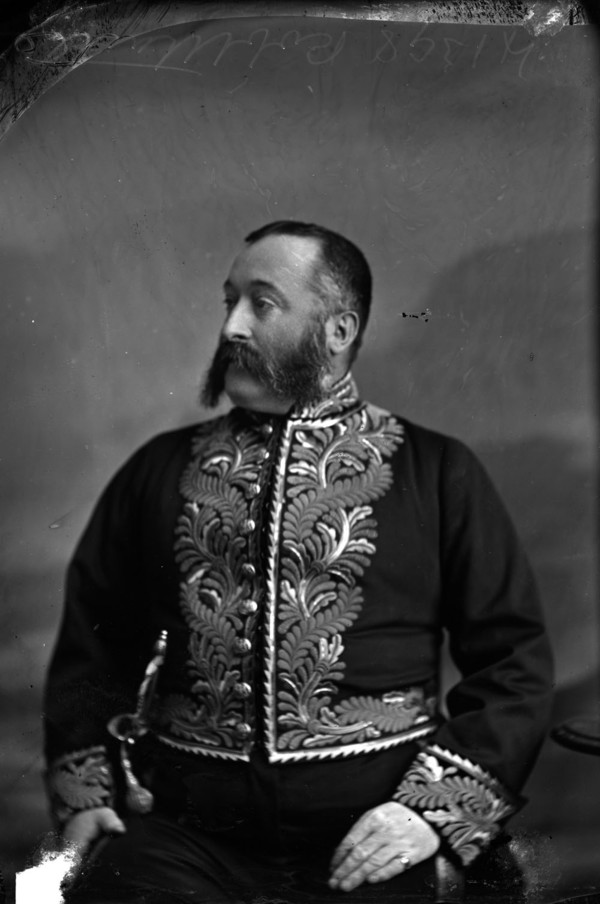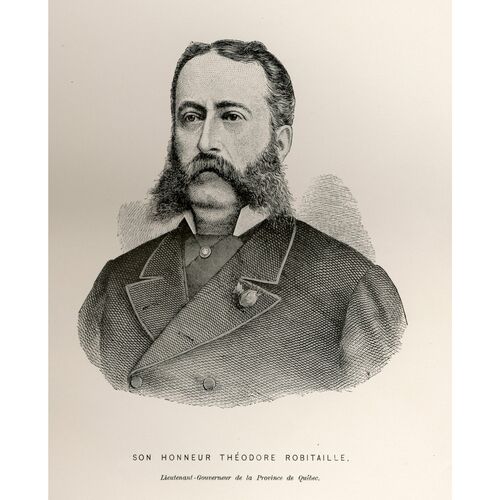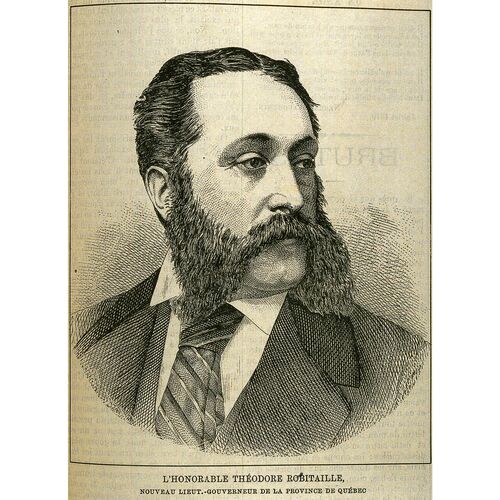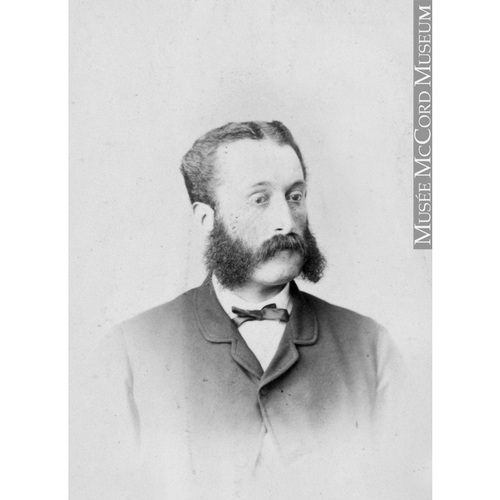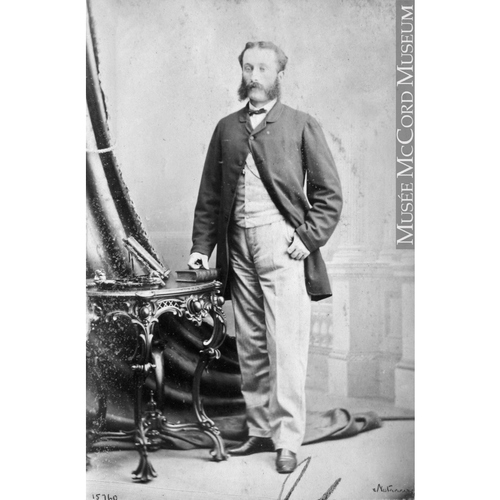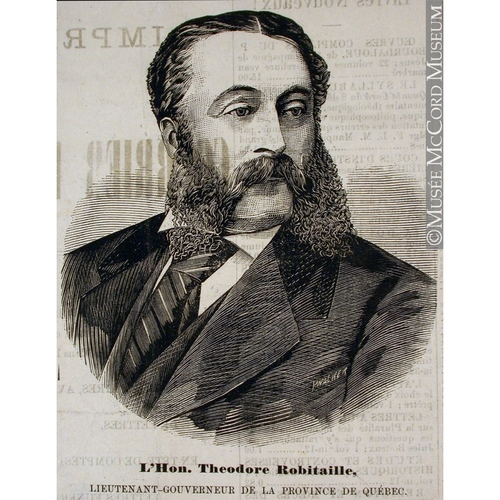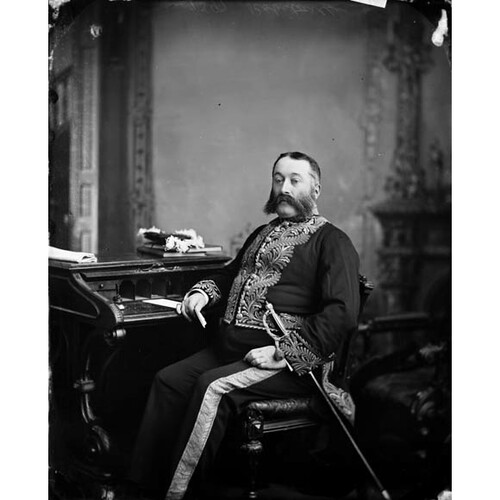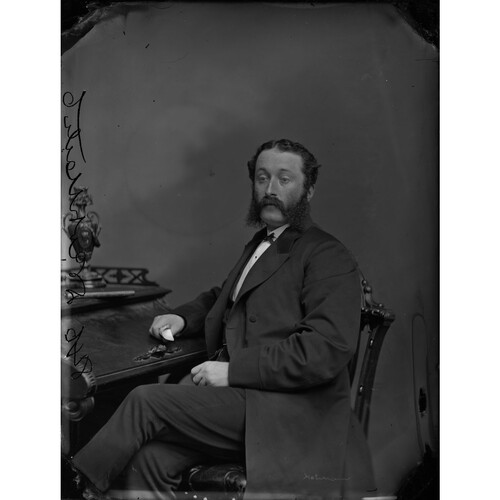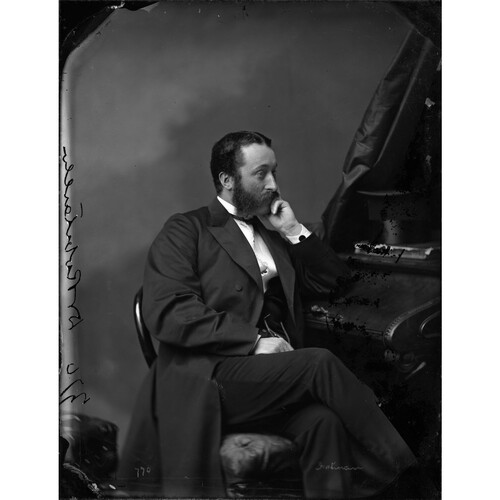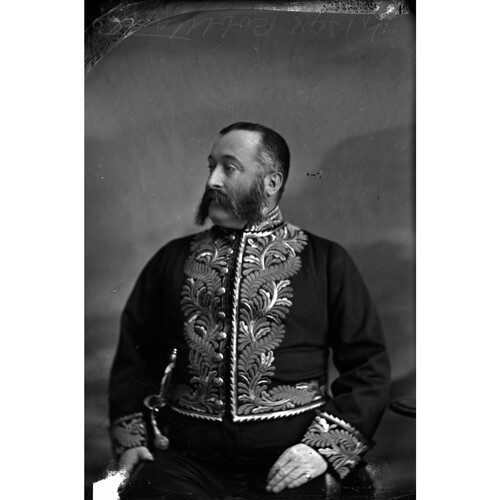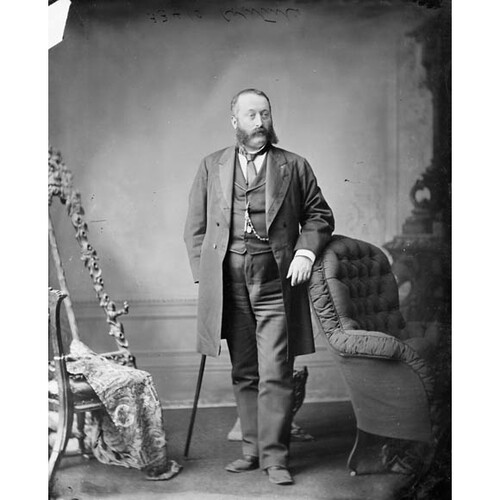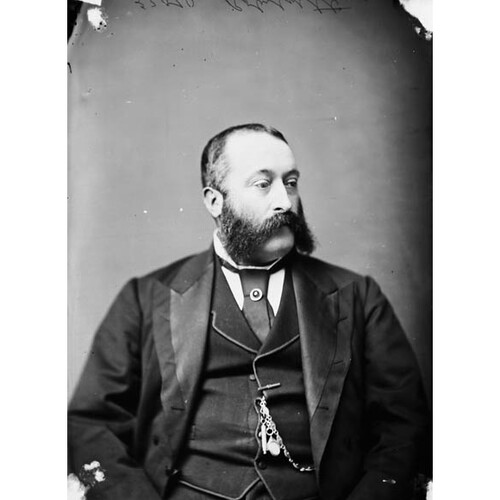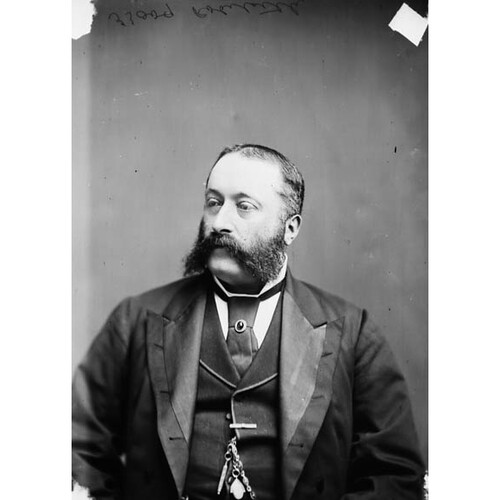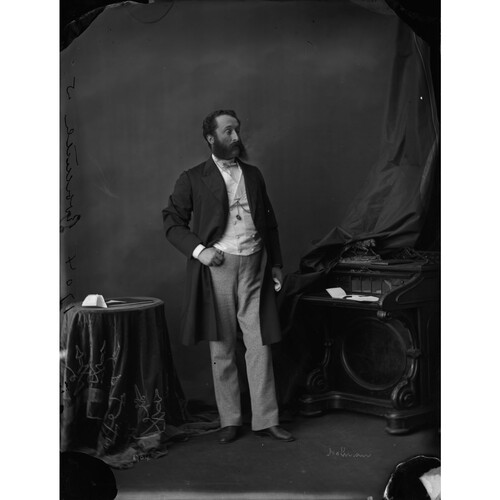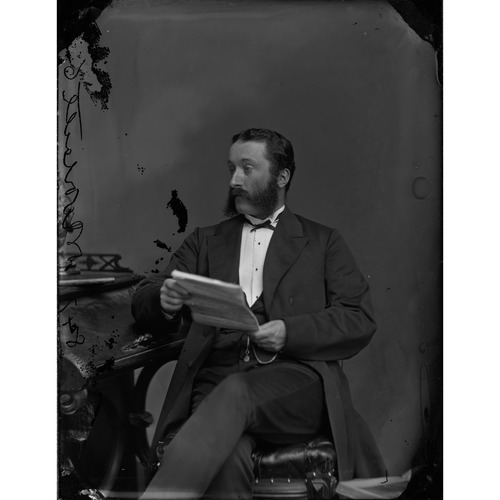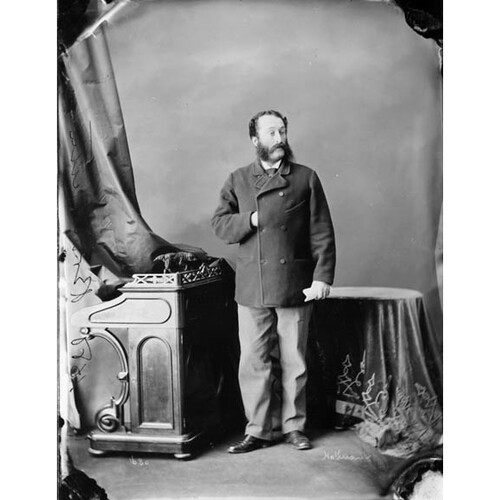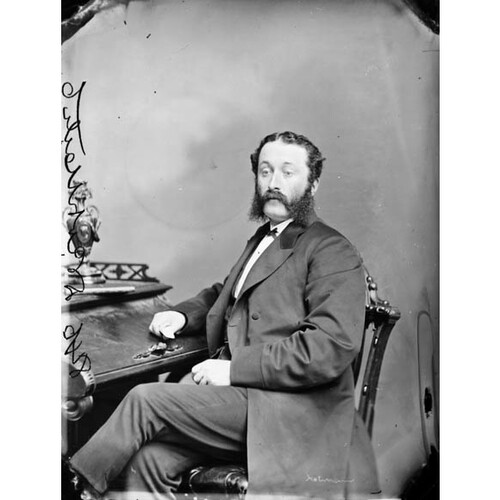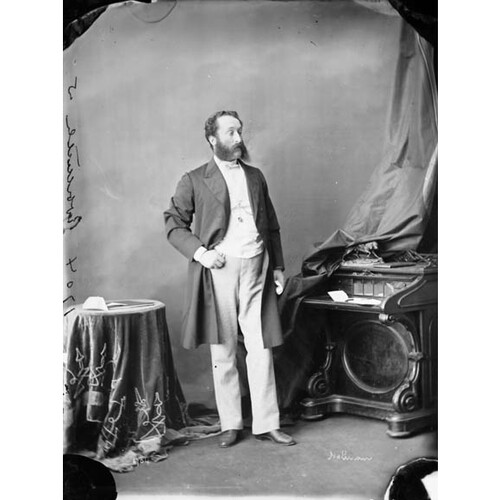ROBITAILLE, THÉODORE (baptized Louis-François-Christophe-Théodore), physician, politician, office holder, and businessman; b. 29 Jan. 1834 in Varennes, Lower Canada, son of Louis-Adolphe Robitaille, notary and Patriote, and Marie-Justine Monjeau; m. 6 Nov. 1867 Emma Quesnel, granddaughter of Frédéric-Auguste Quesnel*, at Quebec; they had no children; d. 17 Aug. 1897 in New Carlisle, Que., and was buried 21 August in Sainte-Foy, near Quebec.
Théodore Robitaille received his early education at the model school in Varennes, and then studied in the United States, at the Petit Séminaire de Sainte-Thérèse, located near Montreal, and at the Université Laval. He graduated in medicine from McGill College, Montreal, in May 1858. Meanwhile, in June 1857 he had begun treating the employees of Charles Robin and Company, a fishing operation in the Gaspé. He decided to settle in this region, at New Carlisle, where he was joined in 1860 by his brother Louis, a newly licensed medical doctor.
In 1861 Robitaille embarked on his long political career. On 10 July, at the age of 27, he was elected to the Legislative Assembly of the Province of Canada for Bonaventure. A Conservative, he represented this riding for 18 years, holding the federal seat from confederation until 26 July 1879 as well as the provincial seat from 7 July 1871 until 7 Jan. 1874, when he resigned from the Quebec Legislative Assembly following the abolition of the double mandate.
Robitaille’s arrival on the provincial scene in 1871 was evidence of a power struggle between two forces: Protestant elements in his riding, with the incumbent Clarence Hamilton, a Liberal, at their centre, and interests connected with the Conservative party and the local Catholic clergy. Robitaille also had an important ally in the powerful Charles Robin and Company; the curé of Paspébiac, Charles-Godfroid Fournier, wrote to Bishop Jean Langevin that it supported Robitaille “not as a Catholic, but only as a friend.” “Any other Catholic except the doctor would not be so lucky,” he added. Hamilton’s defeat led to a formal complaint of corrupt electoral practices, Robitaille being accused of intimidating and bribing the voters.
Robitaille was, however, primarily a federal politician. Although there was nothing remarkable about his long parliamentary career, this member of Sir John A. Macdonald’s “old guard” was considered a moderate and influential politician and was respected by both political parties of his day. His attention was most taken up with colonization, fisheries, and communications, and he contributed a great deal to his riding. For a short period, from 30 January to 6 Nov. 1873, he sat on the Privy Council of Canada as receiver general, replacing Jean-Charles Chapais*.
On 26 July 1879 Robitaille obtained the most important political office of his career when he became lieutenant governor of Quebec following the dismissal of Luc Letellier* de Saint-Just. There was only one memorable event in his vice-regal term, which ended on 6 Nov. 1884. When in October 1879 Liberal premier Henri-Gustave Joly* found himself in a minority in the house he requested a dissolution, confident that, if a general election were called, he would be returned with a majority. Robitaille refused. Confronted with this negative response, the Joly cabinet resigned and Joseph-Adolphe Chapleau formed a Conservative government. The Liberals hinted that Robitaille’s refusal had the appearance of a coup d’état.
Lieutenant Governor Robitaille liked to entertain writers and artists at his table; it was he who originally asked Calixa Lavallée to compose the music for O Canada, written by judge Adolphe-Basile Routhier*. His worldly tastes caused him some minor problems, for example when Archbishop Elzéar-Alexandre Taschereau of Quebec and Abbé Thomas-Étienne Hamel of the Université Laval declined an invitation from him “in order not to give the appearance of approving his Honour’s conduct in permitting the lively dances condemned by the religious authority.” Robitaille also lived in luxury at New Carlisle, where he owned a magnificent summer home – referred to as the lieutenant governor’s château – and ostentatiously drove around in a coach with a liveried driver. When he became the senator for Gulf division on 29 Jan. 1885, he maintained his aristocratic style of life.
Robitaille had become quite wealthy as the promoter and manager of a company interested in building the first railway on the Gaspé peninsula. In 1871, when he sat in both federal and provincial parliaments, he had brought together a few shareholders, including his brother Louis and his brother-in-law Louis-Joseph Riopel, to form the Bay of Chaleurs Railway Company. The following year a provincial law was passed authorizing the construction of a railway from Matapédia, on the Intercolonial route, to Paspébiac. By 1877, although it had received several grants, the company had still not begun work. The project was revived in 1882, mainly through the efforts of Louis Robitaille and Thomas McGreevy. Despite generous federal and provincial subsidies and large grants of public lands, the company went bankrupt in 1890, with no funds in its possession and amid accusations by political opponents of having misappropriated several grants. The next year Premier Honoré Mercier, to save the project, passed the enterprise on to new hands against the wishes of the promoters. Robitaille is said to have been involved in other speculative financial and real estate dealings.
During the last 12 years of his life, Senator Robitaille divided his time between Ottawa, Quebec, and his summer home. He died on 17 Aug. 1897 at New Carlisle after a lengthy illness. His body was taken by train to Quebec, where his funeral was held on 21 August in Notre-Dame basilica. A minor politician of the Macdonald era, Théodore Robitaille devoted much of his attention to large national questions and to integrating the remote Gaspé region more fully into the mainstream of Canadian life.
Théodore Robitaille is the author of Aux électeurs de la division électorale de Bonaventure (Québec, 1879).
AC, Québec, État civil, Catholiques, Notre-Dame de Québec, 21 août 1897. ANQ-M, CE1-10, 29 janv. 1834; P-25; P1000-4-427. ANQ-Q, CE1-1, 6 nov. 1867; P-351; P1000-54-1041; P1000-87-1809. Arch. de l’évêché de Gaspé (Gaspé, Qué.), Tiroir 46 (New-Carlisle); Tiroir 55 (Paspébiac). ASQ, Fonds Viger-Verreau, carton 33, nos.152–70; Journal du séminaire, II: 529; Séminaire, 17, no.10. NA, MG 27, I, C12; MG 28, III 18, 328, chemise Théodore Robitaille, 1857–77. L’Événement, 18, 21 août 1897. L’Opinion publique, 7 août 1879. La Presse, 18, 21 août 1897. Le Soleil, 18, 21 août 1897. Audet, “Les législateurs du Bas-Canada.” Canadian biog. dict., 2: 11–13. Canadian directory of parl. (Johnson). Cyclopædia of Canadian biog. (Rose and Charlesworth), 1: 272–73. Dent, Canadian portrait gallery, 3: 175–76. Le Jeune, Dictionnaire, 2: 536–37. RPQ. Wallace, Macmillan dict. Jules Bélanger et al., Histoire de la Gaspésie (Montréal, 1981). Gervais, “L’expansion du réseau ferroviaire québécois,” 325–36. Ken Annett, “The Robitaille brothers,” SPEC (New Carlisle), 32 (1981), no.7: 14. Alcidas Bourdages, “Les insolences d’un vieux rentier,” Rev. d’hist. de la Gaspésie (Gaspé), 12 (1974): 275–76.
Cite This Article
Marc Desjardins, “ROBITAILLE, THÉODORE (baptized Louis-François-Christophe-Théodore),” in Dictionary of Canadian Biography, vol. 12, University of Toronto/Université Laval, 2003–, accessed January 1, 2026, https://www.biographi.ca/en/bio/robitaille_theodore_12E.html.
The citation above shows the format for footnotes and endnotes according to the Chicago manual of style (16th edition). Information to be used in other citation formats:
| Permalink: | https://www.biographi.ca/en/bio/robitaille_theodore_12E.html |
| Author of Article: | Marc Desjardins |
| Title of Article: | ROBITAILLE, THÉODORE (baptized Louis-François-Christophe-Théodore) |
| Publication Name: | Dictionary of Canadian Biography, vol. 12 |
| Publisher: | University of Toronto/Université Laval |
| Year of publication: | 1990 |
| Year of revision: | 1990 |
| Access Date: | January 1, 2026 |


